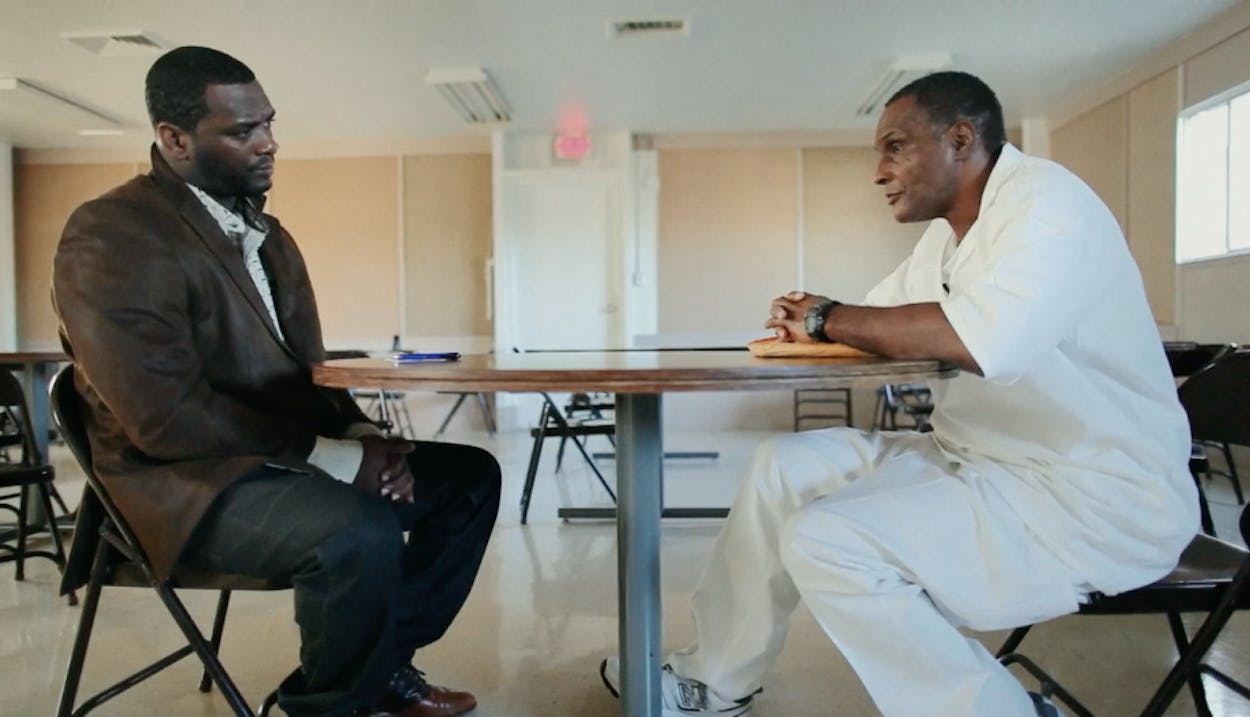In 2014 Texas led the U.S. with 39 exonerations, passing both California and New York in the number of overturned wrongful convictions since 1989. And for the large number cases that still need examining, who better to investigate them than men who’ve been through the process
Enter Christopher Scott, Johnnie Lindsey, and Steven Phillips, three men who spent decades in prison for crimes they didn’t commit. Scott was almost thirteen years into a life sentence for murder when someone else confessed to the crime, which led to Scott’s non-DNA exoneration. It was after his release in 2009 that Scott founded the House of Renewed Hope, a detective agency made up of exonerated men dedicated to investigating wrongful conviction cases from around the country.
In the trailer for True Conviction, an upcoming documentary about the agency, Scott confronts Alonzo Hardy, the man whose crime he spent years in jail for. Although he is understandably frustrated with Hardy for not coming forward earlier, Scott said the ultimate fault rests with a system of courts, judges, and lawyers that continues to convict innocent men. Similarly, Hardy expressed his own disbelief that Scott was convicted in the first place.
“I couldn’t have gotten a fair trial,” Scott told the Texas Observer in 2011. “Listen, I’m not a racist. But I had 12 white jurors, a white judge, a white prosecutor, a white lawyer. I was the only black person in the courtroom. When I walked in, I knew I was going to be found guilty. That’s just how the stage was set.”
And it seems that Scott and his associates aren’t alone. Texas has put effort into addressing wrongful convictions. While Craig Watkins was the district attorney for Dallas County from 2007 to 2015, he established the office’s conviction integrity unit, which exonerated 25 people. Susan Hawk, the new district attorney, recently hired Patricia Cummings to supervise the unit. In a interview with the Dallas Morning News, Cummings outlined some of the upcoming goals and challenges.
When the unit was originally created, it was to focus on cases where there was DNA. The idea was if DNA could prove who the perp is, it could also be used to exonerate somebody. Where we’re headed is you will get to a point where those old DNA cases run out. DNA is not going to be the only scientific mechanism for trying to figure out where we screwed up. So I think we evolve and look at other issues as we learn more about what leads to wrongful convictions.
One of these new focuses will be convictions based on “junk science” such as bite mark evidence, which has been under fire since it was first introduced in courts.
In June, Governor Greg Abbott signed a bill creating the Timothy Cole Exoneration Review Commission, a bipartisan commission charged with spending a year studying exonerations since January 2010. By the end of the study, the commission’s goal is to provide recommendations on how to avoid wrongful convictions.
The commission is named after one of the more notable and tragic cases of wrongful conviction in Texas. Timothy Cole was a Texas Tech student who was convicted in 1986 of aggravated rape in Lubbock. After Cole spent years defending his innocence from behind bars, the Innocence Project and the Innocence Project of Texas followed up on the confessions of a prisoner named Jerry Wayne Johnson and filed for DNA testing of the case. Cole was cleared by new DNA tests in 2008, exonerated in 2009, and pardoned by former Governor Rick Perry in 2010. Unfortunately, his named was cleared posthumously. Cole died in prison in 1999 without any awareness of Johnson’s confessions. In 2014, a bronze statue of Cole was erected in his memory in Lubbock.
Texas also continues pay exonerees the most out of any state in the U.S. According to 2013 reports from the Austin American-Statesman, Texas had paid more than $65 million to 89 exonerated people since 1992. Some exonerees receive $80,000 a year for the rest of their lives on top of a lump sum for the years they spent behind bars. This amount of compensation may seem cushy, but can you put a price on years spent imprisoned for crimes you didn’t commit?
While Texas officials study and make recommendations to improve a justice system that has wrongfully convicted too many people, the members of the House of Renewed Hope are going through letters from imprisoned men pleading their innocence and deciding which cases to pursue. As Scott explained to the Texas Observer after his meeting with Hardy, he knows that his group has a unique understanding of what they’re up against.
It’s easy to separate the world into bad guys like Alonzo and good guys like the cops and prosecutors. But I’ve learned the hard way that it’s not that simple. I’ve seen up close how cops manipulate and confuse eyewitnesses, how prosecutors cherry-pick a jury to convict, how public defenders are overwhelmed, how hard it is to get someone to take another look at your case if you there’s no DNA evidence to test. Meeting Alonzo just made me more determined than ever to do what I can to seek justice.
True Conviction will follow the members of the House of Renewed Hope as they navigate life outside of prison and investigate the cases of other innocent men behind bars. The release date for the documentary hasn’t been announced yet, but the release of the trailer hints that it may be close to completion. Watch the trailer on Vimeo.








